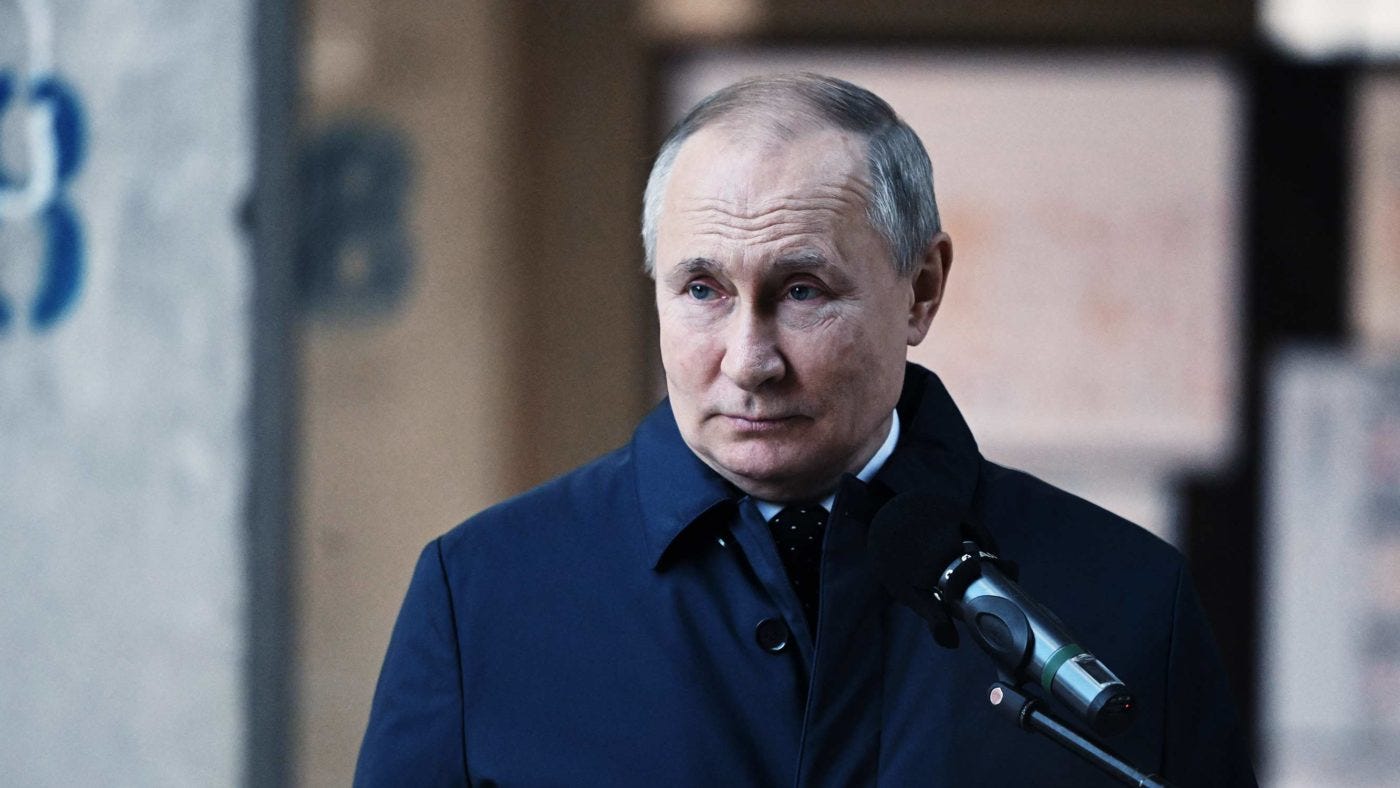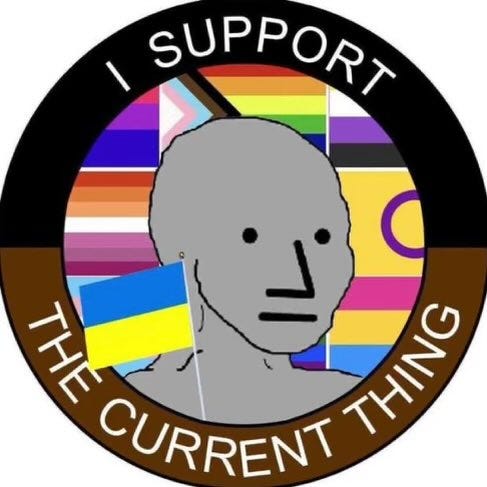Literary Whiplash
Reflections on the acquisition of new best friends and new worst enemies thanks to Russia's invasion of Ukraine
Unlike many people, I had “Vladimir Putin invades Ukraine” on my 2022 bingo card, but that was only because I’ve had “Russia invades Ukraine at some point” on my bingo card since about 1994.
My first novel, The Hand that Signed the Paper, is set in Ukraine against a background of that country’s tragic and bloody history, particularly the 1932-3 Ukrainian Famine (Ukr: Holodomor, meaning “hunger-murder”).
Writing the book made it clear to me that Russia has always considered Ukraine part of itself, much as China sees Tibet and Taiwan as part of itself. This is why, for both sides, the current conflict is existential.
The Hand that Signed the Paper caused a great deal of controversy, and those of you who subscribe to this substack would also know that most of my critics have historically come from the political left. Some of this was based on pure politics: most writers are left-wing, and I’m not, so I copped dislike for that reason alone.
However, a great deal of the controversy concerned how I constructed my characters, and who and what I portrayed with sympathy. Again, the enmity came from left-leaning people, especially in the “literary community”. This was partly because they think that representation matters (so one shouldn’t write from the perspective of people unlike oneself), and partly because they believe historic victims should not be portrayed negatively (so you can’t have a morally deracinated Jewish or black character).
The people I was alleged to have portrayed with too much sympathy were Ukrainians. And the people I’d allegedly made too morally complex were Jews.
This means, for all my foresight on foreign policy or invasions, I did not have right-wingers alleging I’d portrayed both groups too sympathetically on my 2022 bingo card. Meanwhile, I’ve acquired a stack of new Twitter followers and book-buyers with Ukrainian flags in their bios who are clearly not conservatives. The pronouns are a bit of a clue.
Needless to say, I’m suffering from literary whiplash.
The Studio Rounds
So I’ve done the rounds of the studios. My most useful and salient commentary is set out below, although not in date order, because each has a different emphasis based on the outlet and it’s this aspect I wish to highlight.
1.
On the experience of literary whiplash—complete with new best friends and new worst enemies—this segment for TalkRADIO (my interlocutor is Mike Graham, who also shares valuable comments on his experience reporting the Bosnian War) is the pick.
In it, I describe how an Australian book-chain decided—a couple of weeks ago—to promote The Hand that Signed the Paper, only to be attacked by “the usual suspects”, that is, a bunch of literary lefties who don’t like me.
I’ve always found it relatively easy to resist left criticism because I reject the ideology behind it. And, like most conservatives, I don’t hate lefties. I simply think they’re wrong. Underlying that response is a quip of my father’s: don’t take criticism from people you wouldn’t ask for advice. I’ve always considered state-supported writing (government grants for the arts and the like) as little more than a sheltered workshop for talentless progressives. So far, so typical.
However, over the course of about a fortnight, this pattern of 27 years has flipped. The lefties went silent and I encountered intense disagreement shading into abuse from conservatives or people who at least self-identify as “on the right”. Friendly fire is pretty unpleasant at the best of times, and one individual who told me to my face that the Ukraine war isn’t real and that everyone in Mariupol is a crisis actor got, shall we say, a polite but firm response.
2.
During our TalkRADIO segment, Mike and I discussed this piece of mine from American magazine Law & Liberty. In it, I not only cover some Ukrainian history that is simply not known at all in most Western countries, particularly the Ukrainian Famine. I also attempt to explain why there has been so much conspiracism in response to Russia’s invasion.

Shorter me: I think a lot of this has to do with poor quality “in the tank for authoritarian public health” reporting during the COVID-19 pandemic. The media has shown itself to be at least inaccurate and sometimes untrustworthy, and once trust is lost, it’s hard to win it back. A couple may stay together after adultery by one of the pair, but the relationship is never the same.
3.
The comments about the sanctions regime the West has imposed on Moscow in my Law & Liberty piece grew out of an appearance on Live With Littlewood, a panel show run by the Institute of Economic Affairs (famously “Margaret Thatcher’s favourite think-tank”).
As one would expect, IEA Director-General Mark Littlewood focusses on economic issues and effects, in particular the novel experience of sanctions that appear to be working. For those of us old enough to remember how long it took apartheid South Africa to fall off the perch, this is striking.
4.
Although he insists he isn’t an historian, Neil Oliver has written and produced some of the most popular historical television documentaries in British history, and when I appeared on Neil Oliver Live (his GB News show), the conversation was almost wholly historical. Neil and I wanted to make sure that people understood as much background as possible, both about Ukraine’s stymied attempt to join NATO, and the country’s truly dreadful history.
5.
When Putin first pressed the invasion button, I noticed a lot of frankly swivel-eyed rhetoric insisting he was, well, swivel-eyed. This illustrates a problem—common across prosperous liberal democracies—of believing that everyone else wants the same things we do.
Putin clearly does not; he has genuine desires for imperial grandeur. These may be wrong (I think they’re wrong), but being wrong is not the same as being mad. This is something to keep in mind.
To that end, I wrote a piece for wonkish magazine CapX making the points above, but also discussing implications that flow from an enormous policy bungle common to many countries (only Australia seems to have sat it out): Net Zero.
For all the trouble the Russian army has encountered—thanks to a combination of fierce Ukrainian resistance, Western sanctions, arms supplies, and its own huge logistics issues—if Putin wins this war it will be because dingbat environmentalists have scuppered nuclear energy construction and fracking exploration over the last thirty years. Germany’s purchases of oil and gas are literally funding the Russian war machine as we speak.
Next time, maybe don’t get your energy policy from a teenage Swedish school truant.
A few observations
Elon Musk—as I think most people know—has been strongly supportive of Ukraine, liaising directly with ministers in Volodymyr Zelenskyy’s administration, providing access to Starlink, and attempting to ensure the country’s comms stay available to the greatest possible extent. However, he’s clearly annoyed at the way a lot of wokies are creating a toy Ukraine stripped of both its history and current politics, and tweeted the image below on Sunday.
This is wrapped in a lot of memefied internet irony, but the basic point is clear: for those who think supporting Ukraine is part of being on “the right side of history”, no actual thinking is necessary.
I suspect this is at least part of why US conservatives in particular see Putin as a pro-tradition “king” while alienated traditionalists see him as an anti-woke, Christian crusader. Never mind that Ukrainians aren’t woke either: absence of thought is common to both sides in this interminable stooshie. Musk’s funny can easily be re-jigged to mock the automatic contrarianism common on much of the US right.
As I said to Mike Graham on TalkRADIO, I’m now having the awkward experience of staying in ideological place while people with more malleable views process around me. Of course, when the facts change, you should change your mind. But in this case, we’re confronted by an epidemic of changing minds based on no facts at all.







I must admit it's been rather discombobulating to see the usual libertarian or right-leaning people I follow/talk to suddenly become massive fans of Putin, or decide that because Ukraine has shared history with Russia, was a part of the Soviet Union etc, they cannot be allowed to be an independent country. There just seems to be a lot of tribalism, black and white thinking e.g. If the mainstream media supports Ukraine, I must therefore support Russia. That's not to say there hasn't been propaganda, or that Ukraine is some perfect country with perfect politicians, but I cannot understand the levels of support I'm seeing for an invading force taking a country against the will of its people, no matter what NATO has or hasn't done.
Hi Helen. I like how you think. I have been following the situation in Ukraine and Russia from the time the Berlin Wall came down. It has been so interesting. Especially during the Maidan. I stayed up all night and day to watch the streams that came out of that country during that time